The head turns. The arm touches the ground, stopping violently. Movement comes out of the speakers. It starts from zero on the timeline and leads to the end of the loop, its beginning.
Is it the machine that’s in question? Do you obey? Do you try to exist within it, against it, around it? The machine--machina in ancient Rome, mechane in ancient Athens--is still what we call the apparatus of war, all the weapons bought and sold, used and lost during battle: the armor, the gas masks, the Molotov cocktails, the cybernetic networks, prohibitions, negotiations, settlements and the camps (office camps, party regulations, yoga memberships, etc). It is the theater and its apparatus: the entertainer's tricks and special effects, the lights going on and off, the curtains opening and closing, the fake blood, the props and costumes, the fluorescent paint on the masks that pin down the characters, the strings that hold ex-machina gods up in the air ready to turn various histories upside down whenever they settle, finally, for just a second on stage. It is the dubbed sound in Italian Spaghetti Westerns, the actors counting “one, two, three, four, five” instead of speaking sentences. It is Pier Paolo Pasolini adding sound to the film while editing the recorded images. It is Godard's subtitles, his obsession with texts on film and the way he reduces cinema’s speed. It is Roberto Rosellini's remote control gadget for zooming in and his preference for working with amateur actors. It is Maya Deren's cuts and the way she worked with film exposure. It is Jacques Tati’s mime routines, his micro-gestures and their connection to comedia de l'arte.
The machines of theater and the machines of war: they are interchangeable.
“How did it go?”
“Was it successful?”
Machine and tool are one and the same.
There are a million ways to compose and re-articulate a smile, a cry, and the hand holding a glass. A million ways to rehearse and present a cry, a smile, and the hand holding a glass in real time.
They are modules: “the principle behind the distribution of breaks and intervals.”
There is no representation, only presentation and the analysis of the symptom’s mechanisms existing at the moment of the performance.
The tool I use in the performance is my female body. I was born with that body. I could resist it. I could change gender for the performance or pay other people to perform for me. Instead, I insist on presenting myself as I am. The female body with its texts, imagery, history, pain, criticism, revolt. With my female body I can do the gestures of a man and be that. I can be the lion and the fish and the tree and the woman again, another woman perhaps, another posture. I can't pretend I am a non-smoker but I can look like I am a non-smoker. I can't hide my rotten teeth but I can smile in such a way as to camouflage them. That is what I have, simulations.
The women in prison told me that they have learned the techniques and the sensitivities of the State. They told me: “You must move from one point to the other and then back and forth without end.” I do what they told me in their letters. Is it cinema, then, and not performance? It is the war of the war machine, but not the war machine alone. The architectural plans, the social definitions, the prisons, the schools, the asylums, the houses, the offices, the pavements, the public spaces with their park security. It is life under the constant control of the structural, behavioral and moral architects, with their pose of authority and calculated plans. And then there are the ideal citizens, the syncopated rhythms among thousands of them on the streets.
During a riot, though, different politics arise. There are expectations of change, forgotten demands, and the repressed imagination of the lower class. What does it mean to pretend to be a citizen? What does it mean to shout phrases that you don't believe in? What does it mean to shout together with a group of workers? Who are you when you are doing that? Are those your machines of survival your survival kits? Were you born with them or did you just get used to them as you grew up? The Father, the Mother, the Teacher, the Emperor and How am I to obey? When is the right moment to put up the poster and when is the time to go home? Do I want to go to my place or do I want to live at our home?
This is not the end of the text.
Georgia Sagri, New York, 2011

The performance W.I.P (First Episode) was presented as part of the exhibition Skin So Soft, organized by Josh Kline at Gresham's Ghost, 401 Broadway, NY, 6/22/2011, photo by Linda Norden















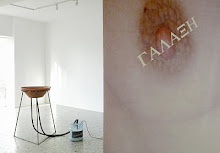










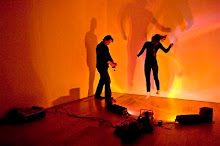

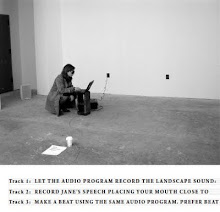




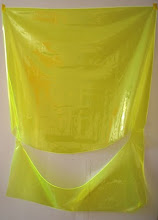
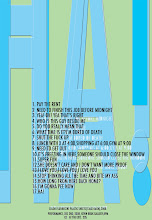


Δεν υπάρχουν σχόλια:
Δημοσίευση σχολίου